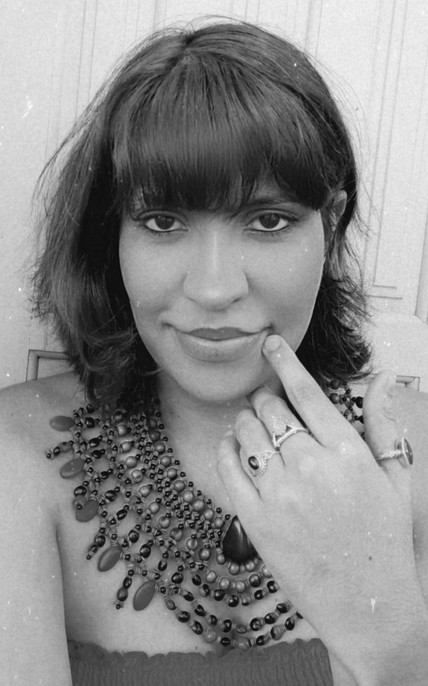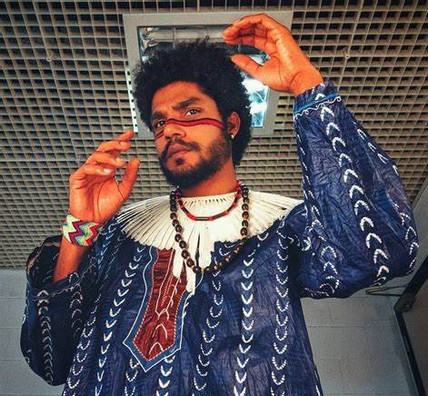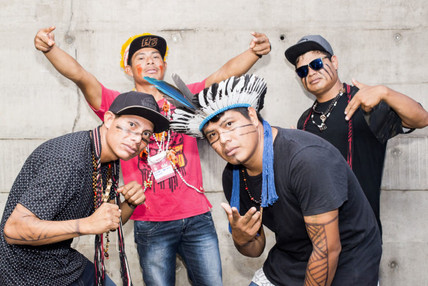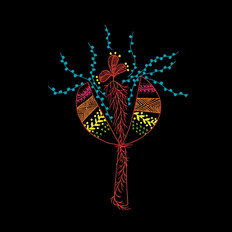
Indígenas.br - Indigenous Music Festival.
9/11 – Saturday – 7:00pm
Documentary show
— Native Resistance: Ayvú Anhenteguá — 4 Winds Productions — Direction: Leonardo Solda
— Nhandesy — Direction: Graciela Guarani
Music video show
— Femicide — Anaranda MC
— Snuff — Nelson D feat VJ Soave
— Native Resistance — Kunumi Mc, Bro MC’s, OZ Guarani
Show
— Demarcation of the stages and indigenous lands* — Edivan Fulni-ô, Oz Guarani (SP)
Chat
— Native Rap — MCs on the wheel — Brô MCs and Oz Guarani. Mediation: Renata Tupinambá.
Native Resistance: Ayvú Anhenteguá
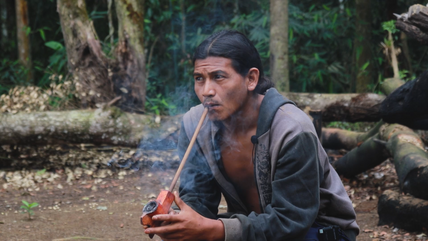
Four Winds Productions presents Native Resistance: Ayvú Anhenteguá. The documentary medium brings views of Guarani culture to nature, mentality and attitude.
The team immerses themselves in the universe of the Guarani people, allowing them to be directed by them. This fact is reflected in the rhythm of the work and the title itself, chosen by the interviewees, which means “strong subject” or “true subject”. The documentary has testimonies from ten people and moves between subjects such as rap, literature, education and spirituality. In addition to having a music video for Brazil’s first indigenous cypher, performed by Matte Records with Brô Mc’s, Kunumi Mc and OZ Guarani.Provocative, but relaxed, “Native Resistance: Ayvú Anhenteguá” brings out issues of utmost importance to society.
General Production: 4 Winds Productions
Executive Production: Coletivo Cultura Viva
Direction: Leonardo Solda
Sound direction: Vinicius Flausino
Research and screenplay: Four Winds Collective Productions Living Culture
Interviewed: Olivio Jekupé, Kerexú Mirim, Valdir Karaí, Werá Jekagua Mirim (Kunumi Mc), OZ Guarani. Jeffersom, Mirindju, Bro MC’s, Bruno Veron, Clemerson Batista, Kelvin Peixoto, Charlie Peixoto
Achievement: Four Winds Productions
Nhandesy
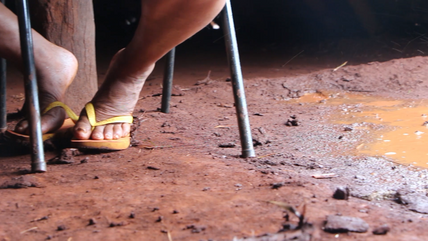
Nhandesy brings an intimate narrative with the original ancestry and its way of seeing and feeling “our mother, our land”, and at the same time warns of how humanity has dealt with it. The doc has as its conductor the song Mamo oyme ndory, Tekoha pyma oyme (Where is her joy she is in tekoha).
Director: Graciela Guarani
Genre: Documentary
Photography: Graciela Guarani and Alexandre Pankararu
Assembly: Alexandre Pankararu
Femicide - Anaranda MC
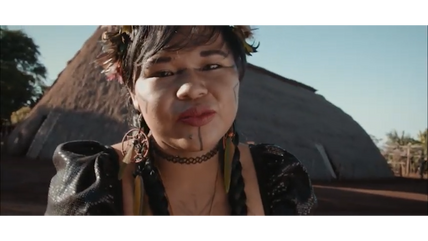
Randa Kunã Poty Rory, a young man of the Guarani-Kaiowá people, is the name Ana Lúcia or Anarandá Guarani, as she is known, and means “bright flower woman, charismatic and communicator”. The young artist, an environmental management student at the Federal University of Grande Dourados (UFGD), says that she decided to be a singer to transmit to the world the culture and reality of her people through music.
Snuff — Nelson D feat VJ Soft
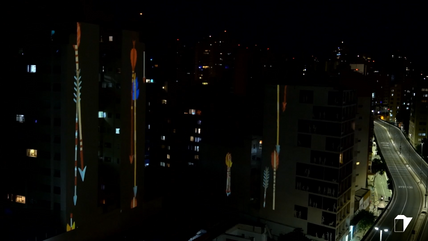
Visual artists VJ Suave and musician Nelson D join in this collaboration that mixes sound and visual elements of the Brazilian indigenous ancestry with the psychedely and fruitfulness of electronic technology. Snuff (“path” in Nheengatu language) is an audiovisual path where Nelson D’s music is reflected in a magical and frantic sequence of VJ’s duos. Through animations and video captures, the group of artists move around two arguments: the indigenous identity in our time and the important entity of nature and land. What does it mean to be indigenous in our contemporary times? How is indigenous plurality expressed in our society when most of the time the latter makes it invisible?
How is the indigenous experience expressed through different non-original technologies? These guidelines are intervals in the course of the show with the important presence of nature, interpreted as a generator of animal and plant life, a spreader of fauna and flora with which humans have not yet realized a respectful and prosperous symbiosis.
Luminescent tropical flowers, endeared jaguars, psychedelic insects and many more elements become the objects by creating scenes and visual patterns, accompanying the sound path created by Nelson’s songs, which exploring different BPM, creates an epic and at the same time dancing soundtrack. A futuristic indigenous experience that does not fail to shout an urgent social and environmental message.
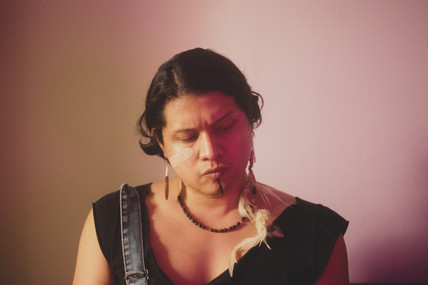
Music producer, DJ, musician, singer and performer. Born in Manaus in Amazonas, it was adopted by an Italian family in 1986. He studied Fine Arts in Milan, but chose São Paulo to disseminate his work as a musician and music producer. As a foreigner on his own land, in an indigenous alien psychic vest, his music is an invocation of return to his ‘ancestral territory body’, a call to his people whose name has been erased.
Nelson D’s musical research immerses itself in the sources of electronic music and indigenous cultures, mixing organic and traditional sounds with technological processes, fitting into the concept of Indigenous Futurism. It follows an intimate sound path where officially the artist confronts himself, not only as a music producer, but also in a performer’s dress, in a futuristic rite for ancestral echoes in search of original memories, a profaning invitation that becomes’ sacred ‘and a body that does not define itself, nor limit, but overflows breaks in reexistence outside chronological time, abandons labels, labels, revealing liquidity of identity in postmodernity and cultural contrasts.
Nelson’s references are artists such as Tricky, Radiohead, Young Fathers, Prodigy, Son Lux, and Tanya Tanaq. Nelson D makes Beats himself a ritual trance, between different rhythms, with a dark and melancholic mood half Trip Hop, without losing the Rock and Indigenous outfit that accompanies all his work. The themes addressed also match the experience of the urban forest in São Paulo with its contradictions.
Native Resistance — Kunumi Mc, Bro MC's, OZ Guarani
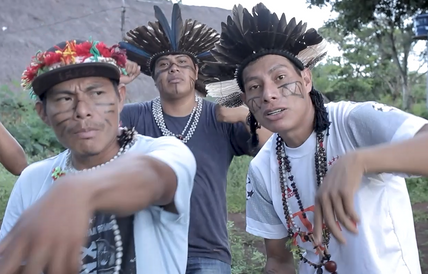
Native resistance has already been born great: it is the first indigenous cypher produced in Brazil — with Portuguese and Guarani verses. The union of rapper Kunumi MC with the groups Oz Guarani and Brô MC’s, a pioneer of the genre in the country, generated powerful music, which at the same time denounces the extermination of native peoples and natural resources, offers a connection with the listener — the sense of belonging is inevitable. The track was produced by Vinícius Flausino (Healing Fox), author of the beat and the mix.
The native Resistance clip, directed by audiovisual producer Leo Solda, opens with writer Olívio Jekupé, father of Kunumi MC, exalting the message passed during the cypher. “Rap written with native thinking, which portrays a reality, not a fiction, but a tradition lived from heart that will tell us in this song”, says the poet, who lives in the village Krukutu, in Parelheiros (SP). It’s seven minutes of strong verses and different approaches, from trap to speed flow. The filming, also taken in Jaraguá (SP) and Dourados (MS), the land of the groups Oz Guarani and Brô MC’s, respectively, enrich the singers’ discourse.
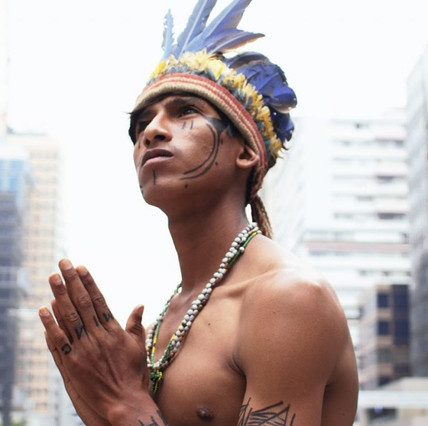
Kunumi MC
Known worldwide for raising the track DEMARCATION ALREADY at the 2014 World Cup Opening, Werá Jeguaká Mirim is 20 years old and two albums already released: the debut EP, My Blood is Red (2017) and the album Todo Dia is Indian Day (2018).
In addition to being a rapper, he is also a writer and has two books published – one with his brother, Tupã Mirin, called Tales of Curumins Guaranis and another he wrote alone, Kunumi Guarani. It is also worth mentioning the book Kunumi MC – The Warrior of the Cup, written by his father, Olívio Jekupé, released with a preface by actor Lázaro Ramos. The work tells the Kunumi saga during the World Cup
His brother Tupã even follows Kunumi on stage as DJ Tupan and together lead the strength of Native Rap, a new segment of Hip Hop, which is nothing more than musical creation from the vision of a native indigenous person about his own culture. In addition to rap, Kunumi also delves into sacred songs, healing songs, such as Jaguatá Tenondé, his most recent release.
The artist is also the main star of the documentary My Blood is Red, produced by the British Needs Must Film. The film, recorded in 2016, took the artist to several indigenous villages throughout Brazil to get to know closely the reality of peoples of different ethnicities. One such meeting was with leader Sônia Guajajara. Throughout this trajectory, he can witness the violence practiced by ruralists, loggers, miners and politicians against indigenous people. In the parallel, Owerá (Kunumi) meets Criolo, one of the most important rappers in the country, who blesses and thrills him in a meeting of two giants from different generations.
Demarcation of the stages and indigenous lands — Edivan Fulni-ô and Oz Guarani
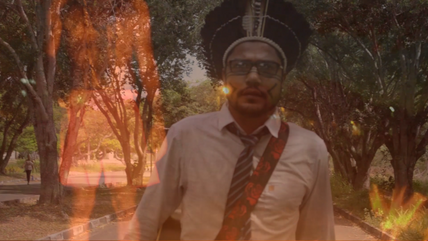
The indigenous struggle continues throughout the ancestral territory, and we young people are the protagonists of this mission inherited by our elders and ancestors, putting into practice what we learn in our indigenous villages and experiences for the sake of indigenous peoples, the forest and our rights as originated in Pachamama. Contemporary Indigenous Music comes with everything to strengthen, and here welcomes you in the immersion of our indigenous music. Demarcation of stages and lands already.
Sound: Ian Wapichana
Image: YouTube + Hortência Sant’ana.
Edition: Hortência Sant’ana and Daniel Scandurra
Screenplay: Edivan Fulni-ô
Production: Edivan Fulni-ô
Band: Oz Guarani (Jefersom Xondaro, Mirindju Guarani) and Edivan Fulni-Ô (Voice, Guitar and Percussion).
Technical Support: Brisa Flow and Haxatag
Thanks: Renata Aratykyra Tupinambá (Originaries Productions) and Yellow House of Collective Culture.
Edivan Fulni-o
Indigenous artist, singer and songwriter of the Fulni-ô people of Pernambuco, born in Salvador and grew up with the Pataxó Hãhãhãe people in southern Bahia. Today she lives in São Paulo and has done copywriting that dialogue with contemporary issues. Both Edivan’s personal history and performance are part of the living memory of the historical union between indigenous and Afrodiasporic peoples in this territory called Brazil.
In his songs, he promotes the breakdown of stereotypes about these historical figures, in a worldview sung from the indigenous perspective and forestry – the forest as a subject. In addition, it immerses itself in universal human issues, such as love, friendship, dreams, and human relations. For the festival, Edivan met with rap group OZ Guarani.
Chat — Native Rap — MCs on the Wheel
Participants: Brô MCs and Oz Guarani.
Mediation: Renata Tupinambá.
Many indigenous youth have embarked on rap to claim their rights to the land and to their ways of existing and to see the world. The confrontational speech to take possession of the country’s political scene in the fight for their rights as “indigenous” and also a way of talking about their spiritual practices interspersed with sacred songs (mborai).
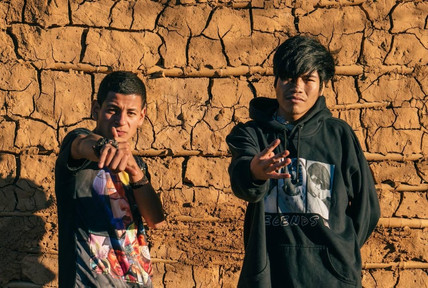
Oz Guarani
Founded in 2014, the indigenous rap group OZ GUARANI is made up of young Guarani M’byá warriors living from the Jaraguá Indigenous Territory in São Paulo, who perform songs of resistance and strengthening the indigenous struggle for their rights, through rap and hip hop, idealizing a project of reflection and culture, knowledge and resistance through music.
The Xondaro Kuery, a word that means warriors in the Guarani language, who make up the OZ GUARANI rhyme the representation of the struggle in rhythm and poetry. They undertake the mission of publicizing the needs of their people, recount the daily problems experienced in the community, in addition to narrating the historic conflict over land demarcation and indigenous resistance.
In 2017, a team came together in a collaborative action of musical producers to improve the group’s work. Each producer created new bases and transferred their creation to the group. This initiative took place in order to start a project to record a CD without using the beats available on the internet. It was then that talented and well-known professionals were invited to this action: DJ Tudo created the beats for the song Pemomba Eme and consecutive DJ Jeff Bass from the song Guerreiro, Thiago Pinheiro from the song Conflictos do Passado, Malak Beatz from the song Contra PEC, Ismael Lima from the song O Índio É Forte and Gaspar Z’África Brasil the song Xondaro Ruvixá.
Bro MC’s
Made up of rappers Charlie Peixoto, Kelvin Peixoto, Clemerson Batista Veron, and Bruno Veron, Brô is considered the first indigenous rap group in Brazil. The four members live in the villages of Jaguapirú and Bororó, which are located in the city of Dourados in Mato Grosso do Sul. His raps mix Portuguese and Guarani to talk about their daily lives.
Brô MC’s began when Veron was attending the Araporã Municipal Indigenous School in 2006. The director, at the time, asked the students to submit a paper talking about the environment, but in a different format, which would escape normal academic standards.
It was then that Veron Brô MC’s – Koangagua began to rhyme Guarani with Portuguese in the hip hop rhythm. Years later, in 2009, he joined his colleagues Clemersom Batista, Kelvin Peixoto and Charlie Peixoto to form the group. Since then, they have recorded one CD, planned the second and performed in different parts of the country, such as São Paulo, Rio de Janeiro, Minas Gerais and Brasília – also inspiring the creation of other rap groups.
In 2009, Brô MC’s released its CD at the Conexão Hip Hop Festival – Dourados, followed by the song Eju Orendive premiered on the MinC and MTV portal. They then released the CD Fase Terminal, the music video “No Yankee” 2009. In 2010, the group was inaugurated by President Dilma. They presented themselves at the Thematic Social Forum, 2012. Show Brô MC’s on the TV show Altas Horas.
In 2016, the group participated in the recordings of the TV series Guateka; in addition to several presentations at the São Paulo Sesc units. In 2018, the group participated in a series of lectures and shows at the “Weltkulturen” Museum in Frankfurt, Germany and received the Marçal de Souza Tupã’y award. The song “Red Earth” is on the soundtrack of the short film “In Search of an Evil Land” shown at the Generation Show of the 7th Berlin International Film Festival.
